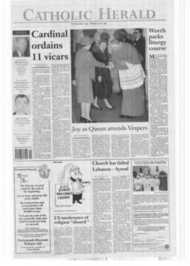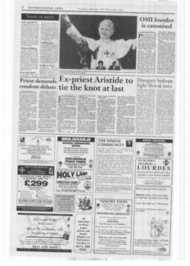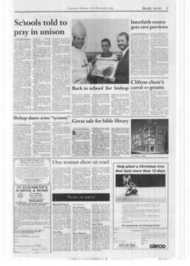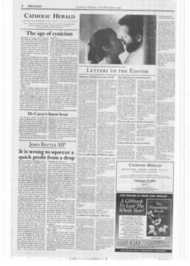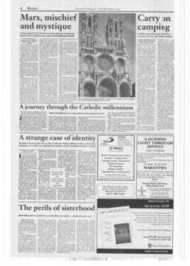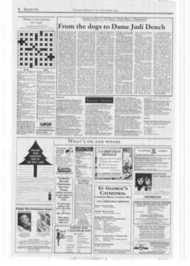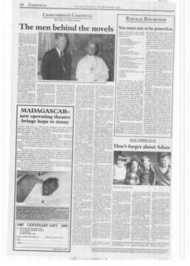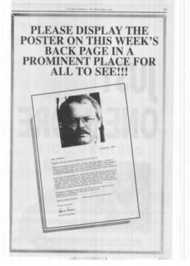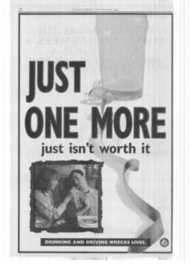Page 10, 8th December 1995
Page 10
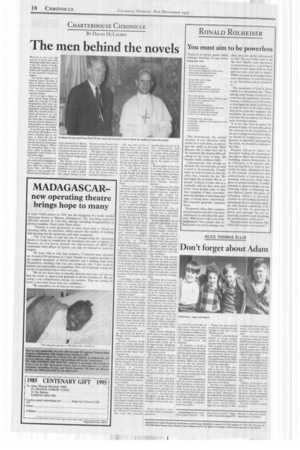
Report an error
Noticed an error on this page?If you've noticed an error in this article please click here to report it.
Tags
Share
Related articles
African Diary
Villains In The Vatican... Again
Hark! The Herald Angel Sings Of Hope And Justice For All
Garden
CHARTERHOUSE CHRONICLE
BY DAVID MCLAURIN
The men behind the novels
WINTER IS NOT JUST the season of mists and cold, blustering winds; these days it is also the season of books, all fighting for space on the shelves and vying for position in the lucrative Christmas market.
The books pages of our national papers become, at least in theory, more interesting at this time of year, but I for one feel a mounting sense of hopelessness as I scan the reviews.
It is not that I object to more novels being written. Quite the contrary. It is the biographies that leave rue reeling, and in particular the biographies of literary figures. That they should attract so much attention is in one sense fair: to write a biography must take an enormous amount of work, whereas it is quite possible to write a good novel in the space of a month.
A novelist can often dash something off without too much research, but if you want to write the life of Tolstoy or Graham Greene, you can spend the better part of a decade doing so. When one remembers this, it may seem unfair to grudge the biography's pride of place on the books pages.
It is not my intention to cast scorn on the biographer's art or suggest it is a waste of time when the subject is a Great Man. AN Wilson's Tolstoy is a case in point: Mr Wilson learned Russian, tray
elled extensively in Russia, read every word that Tolstoy ever wrote, and more or less everything anyone ever wrote about him, and at the end of it all produced a staggeringly good book.
His Tolstoy is the definitive biography, and I am not using the term in the way publishers use it on the back of books. It really is definitive, simply because it says the last word on Tolstoy's life, and ensures that no one else need have a second stab at it.
We ought to be grateful for the book, because Tolstoy was far more than just a writer; besides writing Mr and Peace, he lived the sort of life that was emblematic of his times, and resonant for our time as well. The fact that Mr Wilson shows this proves what an excellent biographer he is. But my real grouse is against those who write admirable lives of the not so great. Do we really need three hefty volumes on Graham Greene? Do we really want to know all about Evelyn Waugh and Nancy Mitford?
Isn't the fact that they wrote some jolly good books enough to satisfy us? I love reading Waugh and Mitford (I can't stand Greene, hut that's a different story), but do I really want to read about them?
There is a serious point behind this. Does our knowl edge of an author's life have any effect on our enjoyment or understanding of their work? The answer can only be that it cannot. To see novels as veiled autobiogra phy is to defeat their purpose, which is primarily to be products of the transforming spirit of the imagination. If you identify the splendid Uncle Matthew in The Pursuit of Love with the real life Lord Redesdale, the book's charm is completely destroyed.
Uncle Matthew is hilarious and memorable simply because he isn't Lord Redes dale, who was neither. A knowledge of Nancy Mitford's life quite rubs the sparkle off her novels.
As for Evelyn Waugh, I am beginning to suspect that the huge amount written about him may have damaged his standing as a novelist. Judged by his books alone, he is one of our greatest novelists this century; but the search for the man behind the books reveals him as something of a monster, which I am sure he was not.
I am happy to enjoy The Ordeal of Gilbert Pinfold for what it is a novel; I do not want to be told that Waugh drank far too much and practised what is nowadays called "substance abuse".
Neither do I want to be told, as I once was at Univer sity, that he was a crashing snob and that this somehow diminishes his achievement.
For me, Waugh is his books, and that is enough. He does not need the Tolstoy treat ment, because unlike Tolstoy, he was a simple novelist, and you do not need to know anything about his life to understand his works.
Unfortunately for us all, I am afraid that the shade of Waugh will be troubled for years to come.
Human curiosity being what it is, people will always want to be told that Sebastian Flyte "was" such and such a person, and Mrs Stitch "was" someone else.
This is really too absurd: a character on a page can only be that character. If we allow this sort of silly pseudo-interpretation to continue unchecked, we will eventu ally end up believing that everyone is in fact someone else, and that fiction is a hall of distorting mirrors, regressing to infinity.
Authors themselves may bear some of the responsibil ity for all this. They are often branded as vain and egotistical, and in some cases this may be true. I half-suspect that Graham Greene wore his conscience on his sleeve and trailed around the world with a string of ladies described as his "mistresses" in the hope that some day someone would want to write it all up. The anachronistic term "mistress" is itself a giveaway. It sounds rather grand and evokes the age of Louis XN, and is a useful way of covering up the squalor of adultery.
But the public seems to lap it up. I was once introduced to a rather striking lady of a certain age, who, I was told in tones of breathless admiration later, had "for a time" been Graham Greene's mistress.
I wondered just how long she had lasted in that distinguished position, which at least eight women are supposed to have filled, and whether she boasted of it herself, or let her friends announce it for her.
Whatever the case, it showed that the relationship was not seen as shameful; authorial vanity had turned morality on its head.
But not all authors are so very bad, I am happy to say. Some are endearingly modest. I'd like to think that Evelyn Waugh's celebrated awfulness being rude to strangers, using an ear-trumpet in old age, dressing in hilarious tweed suits, pretending to be a country squire and referring to "claret" as "dart" all this was only an elaborate joke, designed to cover his inner saintliness.
He made a huge amount of money out of his books, almost all of which he gave away, something that has only recently come to light. Behind the monster we are meant to believe in may lurk a rather gentle and perhaps unhappy man.
And what about Somerset Maugham? It is harder to think of a more modest man. Flit photographs show a man who seems a little bewildered by all the fuss being made over him a strong contrast to the smugness and smirks of some contemporary authors. In A Writer's Notebook he serenely predicts that most of his work, apart from "two or three plays and a dozen short stories", will not stand the test of time; and as for Of Human Bondage, surely the best novel written in English this century, "it will be forgotten along with many other better books."
Unlike Greene, Maugham never chose to set himself up as a commentator on matters of great importance; while Greene made a meal out of his agnosticism, Maugham humbly confessed that he simply did not know whether God existed or not.
He described his literary style as "pedestrian". His is the wisdom of a man who knows how limited his knowledge is; but he certainly knew the human heart. Greene writes to show off, but Maugham describes what he sees.
I am sure that wherever English is spoken, long after Greene has become a bad memory in our collective consciousness, people will continue to read the novels and stories of Somerset Maugham, for the life they describe is a life that each one recognises as his or her own.
blog comments powered by Disqus


